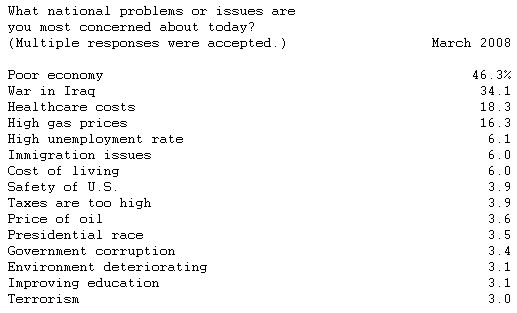"Clearly, the crisis in the credit markets, coupled with significant increases in not just gas but also food has combined to make the average American feel poorer and pessimistic about the future," stated John Gerlach, senior business executive in residence and associate professor in the John F. Welch College of Business at SHU.
Among the top 10 national problems or issues cited by survey respondents, seven are economic concerns:

"Given growing concerns over poor economy, healthcare costs, high gas and oil prices, and cost of living, it's not surprising to see 76.5% of Americans confidently tell us that the U.S. is currently in a recession," according to Jerry C. Lindsley, director of the Sacred Heart University Polling Institute. He added, "Unfortunately, only 31.4% see the coming tax rebate helping to improve the U.S. economy."
According to Gerlach, "Consumer spending accounts for about 70% of our GDP, so it is little wonder that the economy slowed to a 0.6% increase in the fourth quarter of 2007 and is likely to show a decline in the current quarter. A recession is technically two successive quarters of negative GDP growth, but there is little doubt that it is only a matter of time before that occurs."
"The prospect of further problems in the credit markets and increased job losses only adds to the negative feelings by most Americans, and as has been noted by more than one observer, the tax rebate will pay for a decent dinner in most cases and not much more," he said.





